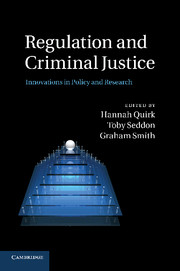Book contents
- Frontmatter
- Contents
- List of figures and tables
- Notes on contributors
- Foreword
- Acknowledgements
- 1 Regulation and criminal justice: exploring the connections and disconnections
- PART I Regulation and criminal justice: framing the debate
- PART II Criminal justice as regulation: responsivity, alternatives and expansion
- 5 Nodal governance and the Zwelethemba Model
- 6 Regulatory compliance: organizational capacities and regulatory strategies for environmental protection
- 7 An intoxicated politics of regulation
- 8 Governing by civil order: towards new frameworks of support, coercion and sanction?
- 9 Counter-terrorism and community relations: anticipatory risk, regulation and justice
- PART III Regulation of criminal justice: monitoring, effectiveness and accountability
- Index
- References
5 - Nodal governance and the Zwelethemba Model
Published online by Cambridge University Press: 04 February 2011
- Frontmatter
- Contents
- List of figures and tables
- Notes on contributors
- Foreword
- Acknowledgements
- 1 Regulation and criminal justice: exploring the connections and disconnections
- PART I Regulation and criminal justice: framing the debate
- PART II Criminal justice as regulation: responsivity, alternatives and expansion
- 5 Nodal governance and the Zwelethemba Model
- 6 Regulatory compliance: organizational capacities and regulatory strategies for environmental protection
- 7 An intoxicated politics of regulation
- 8 Governing by civil order: towards new frameworks of support, coercion and sanction?
- 9 Counter-terrorism and community relations: anticipatory risk, regulation and justice
- PART III Regulation of criminal justice: monitoring, effectiveness and accountability
- Index
- References
Summary
Our brief for the workshop paper in the Manchester seminar series was to consider two related issues. First, the idea of ‘nodal governance’ as a conceptual framework and, second, what has come to be known as the Zwelethemba Model; a specific set of arrangements for governing security in poor urban communities which is an example of nodal governance.
A considerable amount has already been written about the Zwelethemba Model as a dispute resolution mechanism for doing security governance in ways that mobilize local, and often marginalized, knowledges and capacities (Shearing 2001; Roche 2002; 2003; Johnston and Shearing 2003; Dupont et al. 2003; Gerits 2004; Gordon 2006; Froestad and Shearing 2005, 2007a, 2007b, 2007c, 2007d). This chapter adds to the literature by exploring the Model's history and situating it within current debates on the nature of nodal governance and, in particular, on the role of the state.
‘Zwelethemba’ is the name of the community where this Model was initially developed. Fortuitously, the Xhosa word ‘zwelethemba’ means ‘country or place of hope’. At the time of its early development the Zwelethemba Model was intended to explore the political hope – which had been an important feature of the struggle for a new South Africa – for more participatory forms of governance that would accord poor communities a greater voice in their governance.
- Type
- Chapter
- Information
- Regulation and Criminal JusticeInnovations in Policy and Research, pp. 103 - 133Publisher: Cambridge University PressPrint publication year: 2010
References
- 4
- Cited by



